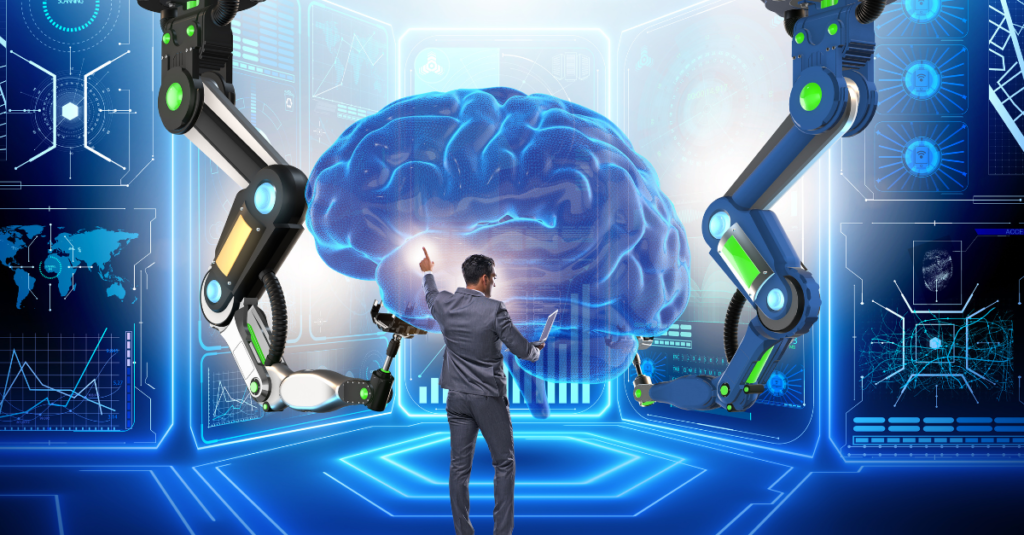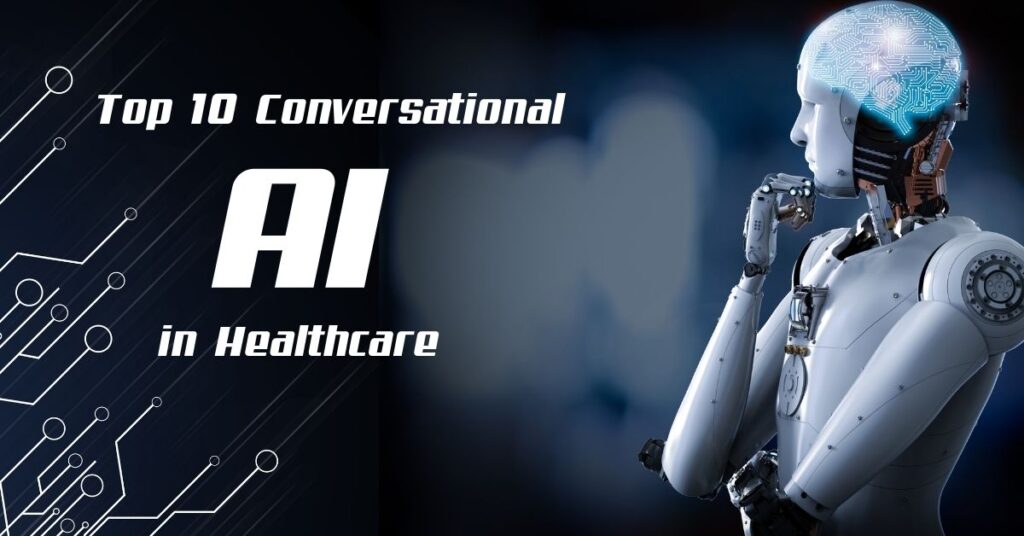
Big data and machine learning are revolutionizing the healthcare industry, with the application of artificial intelligence (AI) bringing substantial improvements in diagnostics, treatment, and patient care. AI tools are designed to support healthcare personnel in various tasks, including administrative workflows, clinical documentation, image analysis, medical device automation, and patient monitoring.
The role of AI in healthcare is crucial, as it has the potential to result in cost savings, proactive health management, personalized treatments, and more efficient follow-ups. From AI solutions in healthcare to advancements in AI technology, the impact of AI on healthcare innovations is remarkable. Let’s delve into How AI is Used in Healthcare, Its various applications, and explore the benefits it offers.
Technological Advancements in AI for Healthcare
The field of AI and data science has witnessed significant technological advancements in recent years. One of the key breakthroughs is the development of deep learning, a subset of AI, which has revolutionized the way AI tools are being used in healthcare. Deep learning, based on artificial neural networks, has the ability to find complex correlations that were previously unattainable.
Companies like IBM Watson and Google’s Deep Mind have made remarkable strides in utilizing AI for various healthcare tasks. IBM Watson has demonstrated its capabilities in analyzing medical images, while Google’s Deep Mind has shown its potential in predicting patient deterioration. These advancements highlight the transformative impact that AI can have in healthcare.
The exponential growth in computing power, coupled with the availability of vast amounts of healthcare data and the emergence of talented AI professionals, has further accelerated the development and adoption of AI tools in healthcare. As AI continues to advance, we can expect even more innovative solutions that will improve diagnostics, treatment, and patient care.
AI Applications in Healthcare
AI is revolutionizing healthcare by providing valuable support to healthcare staff in various areas. From administrative workflows to image analysis, robotic surgery, virtual assistants, and clinical decision support, AI applications are improving efficiency and patient outcomes. These AI tools are designed to enhance the work of healthcare professionals, rather than replacing them.
Administrative workflows in healthcare can be time-consuming and prone to errors. AI-powered tools can automate repetitive administrative tasks, such as data entry and claims processing, freeing up valuable time for healthcare staff to focus on patient care. This automation not only improves efficiency but also reduces human error in administrative processes.
Another area where AI is making a significant impact is image analysis. AI-powered algorithms can analyze medical images, such as X-rays and MRIs, to detect abnormalities and assist in diagnosis. By leveraging machine learning and deep learning techniques, AI tools can provide accurate and timely analysis, aiding healthcare professionals in making informed decisions.
Robotic surgery
Robotic surgery is another application of AI in healthcare that is transforming the field. Surgical robots powered by AI can assist surgeons in performing complex procedures with precision and accuracy. These robots can analyze real-time data from the surgical site and provide feedback to the surgeon, enhancing surgical outcomes and minimizing risks.
Virtual assistants powered by AI are also becoming increasingly common in healthcare settings. These assistants can help patients schedule appointments, access medical information, and receive personalized recommendations. By leveraging natural language processing and machine learning algorithms, virtual assistants provide patients with convenient and efficient access to healthcare services.
Clinical decision support
One of the most critical applications of AI in healthcare is clinical decision support. Machine learning algorithms can process vast amounts of clinical data, such as patient records, medical literature, and treatment guidelines, to provide healthcare professionals with evidence-based recommendations. This support can improve the accuracy of diagnosis and treatment decisions, leading to better patient outcomes.
In conclusion, AI applications in healthcare are diverse and offer significant benefits to both healthcare staff and patients. From administrative workflows to image analysis, robotic surgery, virtual assistants, and clinical decision support, AI-powered tools are enhancing efficiency, accuracy, and patient care. As AI technology continues to advance, we can expect further innovations and improvements in healthcare delivery.
Machine Learning in Healthcare
Machine learning is revolutionizing the healthcare industry by enabling data-driven clinical decision support. With the ability to process large amounts of clinical documentation and identify patterns, machine learning algorithms are making predictions with greater accuracy than ever before. This technology is extensively used in various areas of healthcare, including disease diagnosis, drug discovery, and vital sign monitoring. By uncovering previously unseen correlations in healthcare data, machine learning allows healthcare professionals to make more informed decisions and improve patient outcomes.
In the field of precision medicine, machine learning plays a crucial role in tailoring treatments based on individual characteristics and treatment frameworks. By analyzing vast amounts of patient data, machine learning algorithms can identify personalized treatment options that yield the best results. This personalized approach to healthcare has the potential to revolutionize patient care and improve overall treatment efficacy.
Clinical decision support is another significant application of machine learning in healthcare. By leveraging predictive analytics and data-driven insights, machine learning algorithms can assist healthcare providers in making informed decisions about patient care. These algorithms can help identify high-risk patients, anticipate potential complications, and recommend appropriate interventions in real time. By providing accurate and timely information, machine learning empowers healthcare professionals to provide the highest level of care to their patients.
Related Post: The Top 10 Conversational AI for Healthcare in 2024
Natural Language Processing in Healthcare
Natural language processing (NLP) is a form of artificial intelligence that enables computers to interpret and understand human language. In the context of healthcare, NLP is being used in various applications to improve diagnosis accuracy, streamline clinical processes, and provide more personalized services. By analyzing and extracting valuable information from medical records, NLP can identify relevant treatments and medications, predict potential health risks based on past health data, and improve overall patient care and treatment.
One of the key benefits of NLP in healthcare is its ability to enhance diagnosis accuracy. By analyzing large amounts of patient data, including medical records and test results, NLP algorithms can identify patterns and correlations that may not be immediately apparent to human healthcare professionals. This can lead to more accurate and timely diagnoses, allowing for more targeted and effective treatment plans.
NLP also plays a crucial role in streamlining clinical processes and providing personalized services. By extracting information from medical records and other healthcare data sources, NLP can automate administrative tasks, such as data entry and documentation, freeing up healthcare professionals’ time for more critical and patient-focused tasks. Additionally, NLP can help personalize healthcare services by analyzing patient preferences and medical history, enabling healthcare providers to offer tailored treatment plans and interventions.
Natural Language Processing Applications in Healthcare
There are several practical applications of NLP in healthcare. For example, NLP can be used to improve clinical decision support systems by analyzing medical literature and patient data to provide evidence-based recommendations to healthcare professionals. Additionally, NLP can assist in extracting relevant information from electronic health records (EHRs) for research purposes, enabling large-scale analysis of healthcare data for population health management and epidemiological studies.
Overall, natural language processing is a powerful tool in healthcare that has the potential to significantly enhance diagnosis accuracy, streamline clinical processes, and provide more personalized services. As the field of AI continues to evolve and improve, we can expect NLP to play an increasingly important role in transforming the healthcare industry.
Rule-based Expert Systems in Healthcare
Rule-based expert systems have been widely used in healthcare for clinical decision support. These systems involve the creation of extensive sets of rules in specific knowledge areas. By applying these rules, expert systems can analyze patient data, interpret symptoms, and provide recommendations for diagnosis and treatment. These systems have proven to be valuable tools in augmenting healthcare professionals’ decision-making capabilities and improving patient outcomes.
One of the main advantages of rule-based expert systems is their ability to process large amounts of data quickly and accurately. By integrating with electronic health record (EHR) systems, these systems can access patient data, medical history, and test results to generate informed recommendations. They can also assist in detecting potential errors or inconsistencies in treatment plans and suggest alternative options based on predefined rules and medical algorithms.
However, as the number of rules increases, conflicts can arise, and the systems may become cumbersome to update. Machine learning, with its ability to interpret data using proprietary algorithms, is gradually replacing rule-based systems in healthcare. Furthermore, the integration of AI technology, including rule-based systems, into EHR systems and clinical workflows remains a challenge but is crucial for the widespread adoption of AI in healthcare.
The Role of Clinical Decision Support
Clinical decision support (CDS) systems, which can be powered by rule-based expert systems, play a vital role in enhancing healthcare delivery. These systems assist healthcare professionals in making timely and accurate decisions by providing relevant medical knowledge, evidence-based guidelines, and patient-specific data. By analyzing patient information in real-time, CDS systems can help identify potential risks, suggest appropriate treatments, and reduce errors in diagnosing and prescribing medication.
Furthermore, CDS systems integrated with EHR systems enable seamless access to patient information, test results, and treatment history. This integration allows healthcare professionals to have comprehensive and up-to-date patient data, leading to better-informed decisions and improved patient care.
In summary, rule-based expert systems have been instrumental in supporting clinical decision-making and improving patient outcomes. While these systems are being gradually replaced by machine learning-based approaches, their importance in healthcare should not be overlooked. The integration of AI technology, including rule-based systems, into EHR systems and clinical workflows remains a challenge but is crucial for the widespread adoption of AI in healthcare.
AI in Healthcare Diagnosis and Treatment
Artificial intelligence (AI) has become increasingly prevalent in healthcare diagnosis and treatment, offering the potential for improved accuracy and efficiency. AI tools are being integrated into clinical workflows and electronic health record (EHR) systems to support healthcare professionals in making clinical decisions and providing optimal patient care.
In the field of diagnosis, AI algorithms are being developed to analyze medical images, such as X-rays and MRI scans, with high accuracy and speed. This allows for earlier detection and more precise diagnosis of conditions, leading to timely and effective treatment plans. AI-powered diagnostic tools can also help healthcare professionals in interpreting complex data and identifying patterns that may be missed by the human eye.
When it comes to treatment, AI has the ability to personalize care and improve patient outcomes. By analyzing vast amounts of patient data, AI algorithms can provide tailored treatment recommendations based on individual characteristics and medical history. This not only enhances the effectiveness of treatment but also reduces the risk of adverse reactions and complications.
Integration of AI into clinical workflows and EHR systems is crucial for maximizing the benefits of AI in healthcare diagnosis and treatment. It allows for seamless data exchange and real-time analysis, enabling healthcare professionals to access the most up-to-date information and make informed decisions. However, further validation and integration efforts are needed to ensure the smooth implementation of AI technologies in healthcare settings.
Conclusion
The integration of AI into the healthcare ecosystem offers numerous benefits. AI technologies have the potential to automate tasks, analyze big data sets, and improve healthcare delivery. By streamlining workflows and providing predictive insights, AI can enhance patient experiences and personalized care.
One of the key advantages of AI in healthcare is its ability to leverage wearable technology for continuous monitoring and remote patient care. AI-powered tools can analyze real-time data from wearables, enabling healthcare providers to monitor patient health more effectively and intervene proactively when necessary.
Although there are challenges to overcome, such as integration and validation, the future of AI in healthcare looks promising. With further advancements in AI technology and increased adoption, healthcare delivery will continue to be reshaped and improved. AI has the potential to revolutionize diagnostics, treatment, and patient care, ultimately leading to better health outcomes for individuals and populations as a whole.
In conclusion, AI in healthcare offers a wide range of benefits, from automating administrative tasks to providing personalized care and improved patient experiences. As technology continues to advance and more healthcare organizations embrace AI, the potential for innovation and transformation in the healthcare industry is immense. The future of AI in healthcare holds great promise, paving the way for a more efficient, accurate, and patient-centric healthcare system.
FAQ
How is AI being used in healthcare today?
AI is being used in healthcare to support healthcare personnel in tasks such as administrative workflows, clinical documentation, image analysis, medical device automation, and patient monitoring. It also has applications in areas like precision medicine and personalized treatments.
What are the technological advancements in AI for healthcare?
Technological advancements include deep learning, a subset of AI, which has revolutionized AI tools. Companies like IBM Watson and Google’s Deep Mind have demonstrated the capabilities of AI in various healthcare tasks, such as analyzing medical images and predicting patient deterioration.
What are the applications of AI in healthcare?
AI applications in healthcare include supporting healthcare staff in administrative workflows, image analysis, robotic surgery, virtual assistants, and clinical decision support. These applications improve efficiency, accuracy, and patient outcomes.
How does machine learning impact healthcare?
Machine learning allows for data-driven clinical decision support, enabling healthcare professionals to process large amounts of clinical documentation, identify patterns, and make predictions with greater accuracy. It is used in precision medicine, disease diagnosis, drug discovery, and vital sign monitoring
How does natural language processing benefit healthcare?
Natural language processing enables computers to interpret and use human language. In healthcare, NLP is used to improve diagnosis accuracy, streamline clinical processes, and provide more personalized services. It extracts useful information from medical records and predicts potential health risks based on past health data.
What are rule-based expert systems in healthcare?
Rule-based expert systems involve the creation of extensive sets of rules in specific knowledge areas. They have been widely used in healthcare for clinical decision support. However, machine learning is gradually replacing them as it allows for data interpretation using proprietary algorithms.
How is AI integrated into healthcare diagnosis and treatment?
AI has been at the forefront of healthcare diagnosis and treatment for several decades. However, integrating AI into clinical workflows and electronic health record systems has been a challenge. Some electronic health record software vendors are beginning to incorporate AI capabilities, but further integration and validation are required.
What is the future of AI in healthcare?
Despite the challenges of integration and validation, the future of AI in healthcare looks promising. Further advancements in AI technology, coupled with increased adoption and validation, will continue to reshape and improve healthcare delivery.

